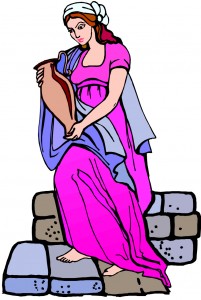Do you want to know what kind of woman Rebekah, the wife of Isaac was? Well read this and let it inspire you:
She was modest with a servant’s heart, selflessness and kind. Genesis 24:11–21 recounts Eliezer’s encounter with Rebecca at the well. He was not interested in a wealthy girl for Isaac. He preferred someone of modest means — the kind who would go to draw water herself, and not have servants do it for her. Eliezer wanted to see how the girl would behave away from her home atmosphere, so that he would have a more accurate perspective of her character. At the well, the girl would be natural and act in accordance with her own character. At home, however her behavior might well reflect the constraints of her family’s orders or expectations. She passed the test, for she spoke only about bringing water for him, and then went on to draw water for his camels. It was second nature to Rebecca that another’s needs should be provided for. This act spoke volumes about her great kindness. That his camels had to be watered was so obvious to her that she saw no need to say she would do it. Unlike the other girls at the well who wasted their time in idle chatter and gossip, Rebecca did her task quickly and without delay. Rebecca acted in a most exalted manner: she lowered the jug herself to spare Eliezer the effort and then actually brought the jug near his mouth, so he would not even have to hold it. Furthermore, she drew all the water for the camels through sheer physical exertion, and this was the great proof of her kindness (kindness denotes an intention to do something which is not obligated). In their first drink, 10 camels would consume 140 gallons of water! That Rebecca would undertake such a strenuous task so eagerly for a total stranger is a supreme indication of her sterling character (The Stone Edition Chumash, pp. 111–113).
She was dignified and possessed savoir-faire. In Genesis 24:62–67 we read that Rebecca displayed personal modesty when she covered her face before meeting Isaac. She recognized intuitively that the stranger she had just encountered was a holy person. Finally, Isaac brought her to his mother’s tent, for it had become apparent that she was a fitting successor to Sarah. It was then that Isaac loved her, for he saw in her one who possessed a spirit that could create a godly home and infuse it with the spiritual qualities to turn it into a temple with her as its priestess. Isaac could love only a mate who could be his companion in creating YHVH’s chosen people. In Rebecca he found such a woman (Ibid., p. 119).
She was a praying woman. (Gen 25:21–22) She was able to hear the voice of YHVH and believe his word.
She was a discerner of character. (Gen 27:1ff) To guard the word of YHVH that had been given to her earlier that the older son would serve the younger and to insure that the birthright would go to Jacob, and to keep the birthright promises and blessings from going to Esau, a wicked and profane individual who had no interest in perpetuating the Abrahamic Covenant, Rebecca took to scheming. She knew that Esau was not worthy of such a divine mission and destiny.
Patriarchs were incomplete without matriarchs. The patriarchs did not function as individuals; their mission in life required the partnership of a wife worthy to be a matriarch to YHVH’s people. This is clear in the relationship of Abraham and Sarah. So, too, only after Isaac married Rebecca did Abraham give him everything he had, which included all his blessings. Only now, therefore, when Jacob was going to find his proper match, could Isaac confer upon him the blessing of Abraham” (Ibid., p. 143, comment on Gen 28:1–5).


